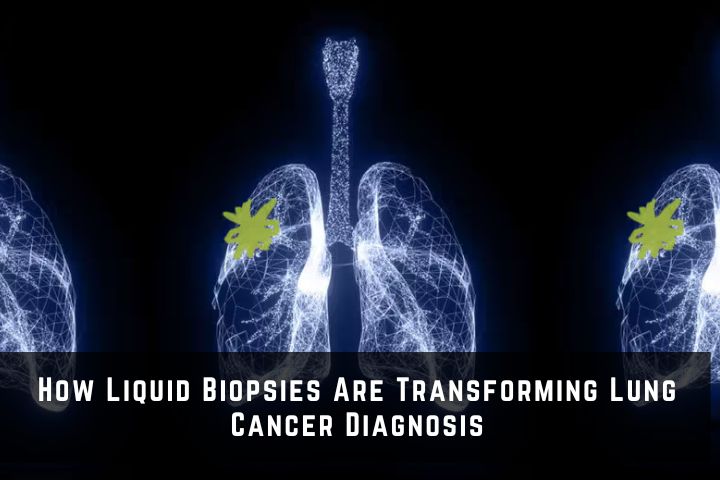Lung cancer remains one of the deadliest cancers worldwide, often diagnosed at advanced stages when treatment options are limited. Traditional diagnostic methods like tissue biopsies, though effective, are invasive, painful, and sometimes risky—especially for patients with poor lung function. In recent years, a revolutionary approach known as the liquid biopsy has transformed how doctors detect and monitor lung cancer.
By analyzing a simple blood sample, liquid biopsies offer a non-invasive, faster, and more accurate way to understand cancer’s genetic makeup. This innovation is reshaping early detection, real-time monitoring, and treatment personalization in lung cancer care.
1. What Is a Liquid Biopsy?
A liquid biopsy is a cutting-edge diagnostic technique that detects cancer-related genetic material—such as circulating tumor DNA (ctDNA), RNA, or even whole tumor cells—in a patient’s bloodstream. Unlike traditional biopsies, which require a physical tissue sample from the tumor, liquid biopsies only need a small amount of blood.
The test identifies mutations or genetic alterations that drive cancer growth, providing valuable information about the tumor’s biology. For lung cancer, these include mutations in genes like EGFR, ALK, KRAS, and ROS1, which play critical roles in determining the right targeted therapy.
One of the biggest advantages of liquid biopsy is its ability to provide a real-time snapshot of how cancer evolves. As tumor DNA circulates in the blood, doctors can track how a patient’s cancer responds to treatment or detect resistance mutations before the disease progresses—helping them adapt treatment strategies quickly.
2. Advantages Over Traditional Biopsies
Traditional tissue biopsies can be invasive, painful, and time-consuming. They often require surgery or bronchoscopy, which may pose risks for patients with advanced disease or poor lung health. Moreover, a single biopsy might not capture the complete genetic diversity of a tumor, especially in metastatic cancer where mutations can differ between sites.
Liquid biopsies, on the other hand, are simple, repeatable, and safer. They allow oncologists to:
-
Detect cancer earlier, sometimes before symptoms appear.
-
Monitor treatment response more frequently without repeated surgery.
-
Identify resistance mutations that might render current therapies ineffective.
-
Personalize treatment using molecular insights from circulating tumor DNA.
For example, if a lung cancer patient’s liquid biopsy reveals a new mutation that causes drug resistance, doctors can promptly switch to another targeted therapy rather than waiting for the disease to worsen.
Additionally, liquid biopsies reduce the emotional and physical burden on patients, enabling more frequent monitoring without discomfort or hospitalization. This has made them a cornerstone of precision oncology—where treatment is guided by the individual genetic profile of each patient.
3. The Future of Lung Cancer Diagnosis and Treatment
The future of liquid biopsy technology looks incredibly promising. Ongoing research aims to expand its application beyond diagnosis and monitoring—to early cancer detection in high-risk individuals. For instance, detecting ctDNA in asymptomatic smokers or those with a family history of lung cancer could allow for intervention long before the disease reaches advanced stages.
Furthermore, as genomic sequencing becomes faster and more affordable, liquid biopsies will play a key role in personalized medicine. They will enable oncologists to map out how a cancer evolves over time, track minimal residual disease (tiny traces of cancer left after treatment), and even predict relapse before imaging scans can detect it.
In short, liquid biopsies are not just a diagnostic tool—they represent a new era in cancer management. By combining speed, safety, and scientific precision, they are helping doctors stay one step ahead of lung cancer.
Advanced Cancer Diagnostics at Dr. A.V. Cancer Institute
At Dr. A.V. Cancer Institute, we embrace the most advanced technologies in cancer diagnosis and treatment—including state-of-the-art liquid biopsy testing. Our team of expert oncologists uses molecular-level insights to design highly personalized treatment plans for each patient.
With a focus on accuracy, compassion, and innovation, Dr. A.V. Cancer Institute provides the best services for lung cancer diagnosis and precision oncology. We ensure that every patient benefits from the latest medical breakthroughs, empowering them with early detection and targeted care.
Dr. A.V. Cancer Institute — redefining cancer care through innovation, precision, and hope.

